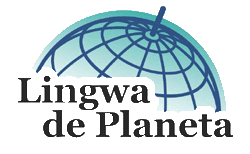|
We begin from the fundamental idea that sooner or later, mankind will inevitably arrive at a universal language, which will be a harmonious integration of 10-12 most widely spoken national languages. Today we observe a process of internationalization (mainly lexical) of languages, and this process will only accelerate. The rapid integration of mankind through the electronic media continues. Increasingly, humanity is thinking coherently, almost as a single whole, with the same words, ideas and neologisms being actualized simultaneously in various parts of the world. There are grounds to believe that in the future, given a sufficient internationalization of languages, the adoption of an international auxiliary based on international words, with a simple grammar, will not seem as revolutionary an act as it might seem today.
Today the integration of mankind is severely hindered by the commercial organization of our civilization, which fosters universal competition, struggles for resources and world domination. There are information wars and struggles for language domination. However, there is no reason to believe that this will go on forever. In order to survive, and to successfully resolve the increasing problems and crises we face, mankind will need, sooner or later, to review our aims, overcome factionalism, and unite. And, of course, a common neutral language that is acceptable for all will be needed. If we imagine some single whole (say, an organism), it is evident that, in order to remain a whole, the parts must communicate with each other in a common language, not in different ones.
The global language 1) should be neutral; 2) should suit most people, should, at least partly, be close to the majority, which means that it should include elements of their native tongues. Any national language is not neutral and gives an advantage to its native speakers. Any a priori language, while being perfectly neutral, is at the same time perfectly alien to everybody. It cannot serve as a unifying language.
As to the figure of 10-12, this is an approximate number, which may be inferred from modern population and linguistic trends, as well as from general structural considerations. The linguistic trends are obvious: the number of those speaking major languages is growing, while speakers of minor languages are decreasing in number. According to some estimates, five major languages — Chinese, English, Hindi, Spanish or Russian — are now spoken by over half of the people of the world.
What, then, are the principles of Lingwa de Planeta?
The first is intelligibility and ease for the majority. This principle, in turn, leads to two others: that of maximum lexical internationality and that of grammatical ease.
The second principle is the adoption of the most spoken languages of the planet. We have taken, as reference, the major European tongues (English, Spanish, Portuguese, French, German, Italian), along with Chinese, Russian, Hindi, Arabic, and Persian. LdP also includes a certain number of words from other languages. This principle is important for the neutrality as well as psychological acceptability of an auxiliary language. Only a language that is psychologically acceptable for the majority can provide a friendly psychological field for international communication and hence for unification.
The fact that demonstrates the importance of psychological acceptability is that people of a subjugated country never accept the invaders' language as their own, even if they understand it well. In no way is intelligibility the only requirement for an interlanguage. We are convinced that elements of one's native tongue in a constructed language evoke strong positive emotions and considerably increase one's interest and motivation.
The third principle is that of naturalism. LdP is based on the living languages and tends to incorporate words without serious deformation. We do not invent non-existing words, and we do not revive the words and grammar elements of dead languages or reconstruct lost common roots. We proceed from the current linguistic situation and take words as well as grammar elements from reality.
In the Language description you will find a description how the mentioned principles work in LdP.
Fo unitaa de Arda!
For the unity of the Planet!
|

